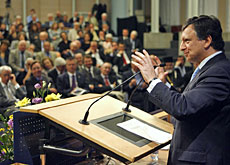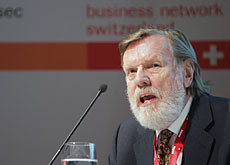EU puts more pressure on Bern on tax issue

The European Union has once again taken Switzerland to task for its policy on corporate taxes, which it claims violates a free trade accord with Bern.
The criticism concerns tax relief – described as illegal and politically unacceptable – offered by a number of Swiss cantons on profits generated by companies inside the EU.
“The European Commission has no doubt that cantonal tax schemes qualify as tax subsidies because they offer an unfair tax advantage to companies in Switzerland for profits generated in the EU,” commented EU Economic and Monetary Affairs Commissioner Joaquin Almunia.
“Income generated in Switzerland is taxed higher,” he told the European Parliament in Strasbourg on Thursday.
Earlier this week senior EU diplomats approved a mandate for talks between the Commission and Switzerland.
Brussels argues that the practice of some cantons of partially exempting profits generated abroad from local company taxes is in breach of the 1972 agreement between Bern and Brussels.
However, Switzerland which is not a member of the EU, has consistently said that corporate tax and the tax policies of the cantons were never parts of the free trade agreement.
Avoiding taxes
Almunia, who is in charge of the 27-nation EU’s economic policy, said those companies that took advantage of the tax breaks were often set up in Switzerland for the sole purpose of avoiding taxes in the EU.
The EU says that cantons Zug and Schwyz, in particular, have attracted multinational companies to set up headquarters, coordination or distribution centres to minimise tax liabilities.
“Similar tax schemes are not allowed inside the EU. Politically it seems hard to accept that a neighbouring country which enjoys a privileged access to our market should grant such tax favours, Almunia said.
The two main political groups in Strasbourg – the Conservatives and Social Democrats – supported the European Commission in its position against Bern.
However, Lithuanian Social Democrat Aloyzas Sakalas questioned whether the EU was asking more of Switzerland than it did of its own members.
Liberal Democrat Diana Wallis, who is president of the committee that oversees relations with Switzerland, did not explicitly oppose negotiations with Bern.
Unmoved
But she questioned the Commission’s argument and asked for proof that the tax breaks were damaging to trade, as claimed by Brussels.
Only ten EU parliamentarians spoke in the debate, which took place in front of many empty seats.
The Swiss government and most political parties have been unmoved by the mounting pressure from Brussels.
The finance ministry has said there are no contractual regulations between Switzerland and Brussels on the harmonisation of company taxation.
Switzerland has pursued a policy of bilateral accords with Brussels after the Swiss rejected membership of the European Economic Area in 1992.
The government has said it is open to discussions to clarify question on the tax issue but has rejected the idea of negotiations.
swissinfo with agencies

More
EU bilateral accords
1972: Switzerland and the European Community sign a free-trade agreement.
1992: Bern lodges an application for membership of the European Union. In the same year, the people reject membership of the European Economic Area.
2002: the first package of bilateral agreements with the European Union comes into force.
2004: Bern and Brussels sign a second package of measures.
Switzerland believes that the 1972 free trade accord with the European Union does not apply to the tax benefits granted to foreign companies by a number of cantons.
It argues that the 1972 agreement is only applicable to certain goods (agricultural and industrial products).
Bern also says that when the agreement was signed, Switzerland and the European Community did not foresee harmonising their legislation. Bern also argues that the rules of the trade agreement must not be interpreted in the same way as internal EU regulations on competition.
The European Commission says that tax privileges granted by some Swiss cantons to foreign companies are contrary to the 1972 accord.
The EU is calling on Switzerland to give up the tax practice and adapt to its demands.
The tax advantages in question concern foreign holding companies whose headquarters are in Switzerland but which make profits abroad.

In compliance with the JTI standards
More: SWI swissinfo.ch certified by the Journalism Trust Initiative



You can find an overview of ongoing debates with our journalists here . Please join us!
If you want to start a conversation about a topic raised in this article or want to report factual errors, email us at english@swissinfo.ch.